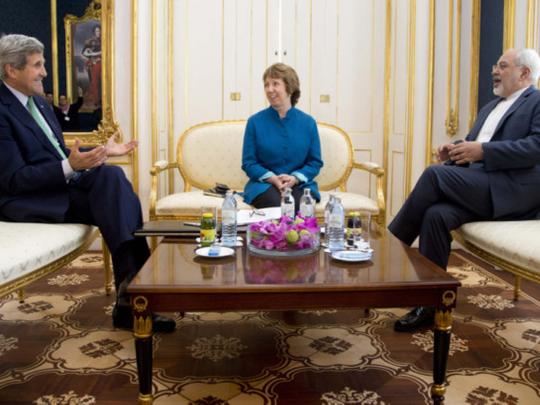
Vienna: Six world powers and Iran were set Thursday to take a hard look at their troubled nuclear talks amid growing calls, resisted by Washington, to extend a November 24 deadline for a deal.
With six weeks left, US Secretary of State John Kerry and his Iranian counterpart Mohammad Javad Zarif in Vienna on Wednesday appeared to secure no major breakthrough in hours of talks.
Kerry was scheduled to leave Austria on Thursday morning, but Zarif was to remain for talks with negotiators from the US, Russia, China, Britain, France and Germany led by EU foreign policy chief Catherine Ashton.
“Everyone has been working incredibly hard... these are incredibly complex negotiations, the detail is extraordinary,” a senior US State Department official said late Wednesday.
“Until everything is agreed, nothing is agreed, and you can get 98 percent of the way, and the last two percent may kill the entire deal.”
She insisted however that pushing back the November 24 deadline to give more time to bridge significant gaps between the two sides was not under discussion.
“We have not discussed an extension. We believe in keeping the pressure on ourselves,” the official said on condition of anonymity.
“If you take the pressure off yourself, then you never have to make hard decisions. Deadlines help people to make hard decisions, and there are hard decisions to be made here. And we must.”
The deal being sought, after a decade of rising tensions, is meant to ease concerns that Iran might be able to develop nuclear weapons under the guise of its civilian programme.
To do this, the P5+1 want Iran to scale down dramatically the scope of its atomic activities, offering in return relief from painful sanctions, but Iran is resisting this.
Iran denies seeking to build the atomic bomb and says it wants to expand its nuclear programme in order to generate electricity and treat cancer patients.
In months of discussions since an interim agreement struck last November took effect in January, some progress has been made.
This includes changing the design of a new reactor at Arak so that it produces less weapons-grade plutonium, on enhanced UN inspections and on the fortified Fordo facility.
The main bone of contention however remains Iran’s enrichment capacity, a process rendering uranium suitable for power generation but also, at high purities, for a nuclear weapon.
Other thorny areas include the pace at which sanctions would be lifted, the timeframe that an accord would cover, and a stymied UN probe into past suspect “military dimensions” of Iran’s activities.
An earlier target date of July 20 was missed, and many analysts have begun to believe that November deadline might be extended again, maybe locking in measures related to Arak and Fordo.
“A fully-fledged agreement by November 24 no longer appears likely. What is still possible is a breakthrough that could justify adding more time to the diplomatic clock,” Ali Vaez from the International Crisis Group told AFP.
Russian Foreign Minister Sergei Lavrov said on Monday in Paris - after meeting Kerry there - that the November deadline was not “sacred”, in the strongest suggestion yet from one of the P5+1 powers.
Zarif earlier Wednesday too appeared to indicate that more time might be needed in order to discuss what he called “serious and innovative” - but unspecified - “new methods”.
“It is possible that more time might be needed to discuss these solutions,” he told state television.
And Iranian President Hassan Rouhani, who has sought to mend fences with the West since coming to power in 2013, has also indicated such a move.
“Our will is that in 40 days the matter will be resolved. But if other things happen and we are not able to solve all the problems, the two camps will find a solution,” Rouhani said on state television on Monday.












